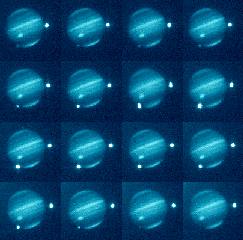

NOTE: Click on the image to view it at its highest resolution.
In K-band (2.2 micron) infrared images obtained with the PtSi camera mounted on the SAAO 0.75 m telescope at Sutherland, a bright fireball was observed by Dr. Kaz Sekiguchi of SAAO. The fireball appeared at the predicted location on the SE limb of Jupiter. The images were taken at 30 second intervals. The earliest faint signs of the fireball appear at about 20:17-20:18 UT, and at peak brightness it was comparable in brightness to Io. After 10 minutes, the fireball image appears to change shape, becoming elongated along the limb, presumably as the heated plume settles back. The last traces along the limb are visible at least as late as 20:38 UT. The rise in brightness is much faster than the decline.
The time sequence proceeds
from top left to bottom right. The images are 30 sec exposures, at intervals
of 1 minute, starting at 2017 UT, ending at 2032 UT. South is up and west
is to the left. The bright moon is Io, and the Great Red Spot is clearly
visible on the surface of Jupiter. The impact produced a flare which
rapidly increased in brightness and decayed slowly. This flare is probably
from a plume of material which becomes visible above the limb of Jupiter.
Rotation probably plays little part in the observed event.
![]() Images, Images, Images
Images, Images, Images
